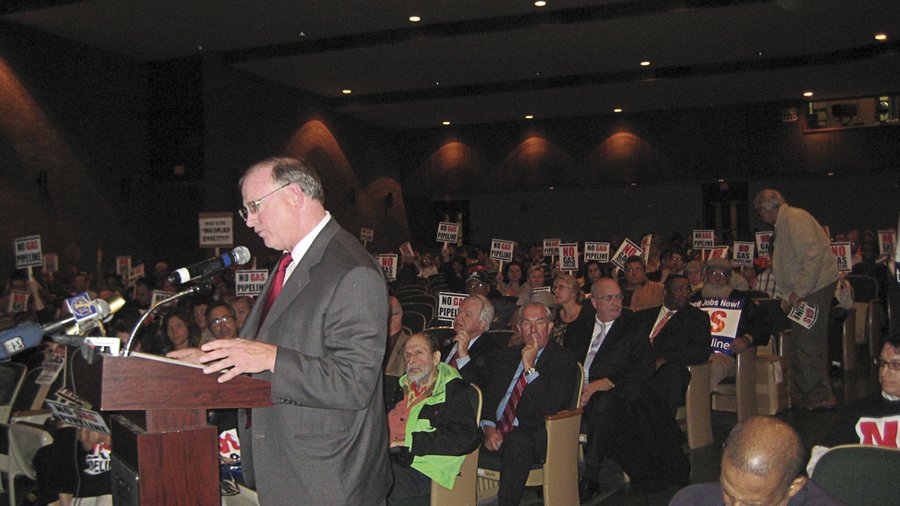Giving the clearest message to date that Jersey City will go to court to block a controversial natural gas pipeline that could be routed through the city, Mayor Jerramiah T. Healy went on record last week stating his intentions.
Describing the city’s fight against Spectra Energy as a “David and Goliath-type battle,” Healy said that if the pipeline is approved by the federal government, the city is “prepared to file suit to overturn such a decision.”
If approved by the Federal Energy Regulatory Commission (FERC), the proposed pipeline would include 19.8 miles of new and replacement pipes, six new stations, and other related modifications in Linden, Jersey City near the Hoboken border, and Bayonne.
This is the first time Healy has explicitly stated the city’s intention to sue.
____________
FERC is expected to approve or deny Spectra’s application to build the pipeline early next year, having heard the objections of Jersey City’s municipal government and many residents.
Since FERC rarely denies such applications, residents and public officials believe the federal agency will simply rubber-stamp the company’s application.
The mayor had previously indicated that his administration would sue to block the pipeline, but this is the first time he has explicitly stated the city’s intentions.
Healy: Environmental Impact Statement ‘deficient’
The city’s plans to file suit were revealed last week with the mayor’s 28-page response to FERC’s draft Environmental Impact Statement (EIS). Public responses to the EIS were due Oct. 31.
FERC’s lengthy EIS details the agency’s opinion that the pipeline will have minimal impact on
Jersey City residents, transportation infrastructure, property values, future real estate development, and the environment.
But in his response to the EIS, Healy details what he called a “deficient” report that “does not consider the full range of project impacts and alternatives.”
“FERC does not discuss the implications of a pipeline breach, whether accidental or intentional, in a high density area like Jersey City,” Healy says. “In fact, the city submitted a computer simulation showing the effects of an explosion, which FERC did not mention at all.”
FERC has already rejected an alternative pipeline path that would route the natural gas line through Brooklyn, Healy said, “for many of the same reasons that [Jersey City] objects to the project: the pipeline would go through densely populated areas, close to dwellings, cause traffic delays, close roads, and impact buried utility lines. FERC does not explain why these impacts are significant and preclusive when they occur in Brooklyn, but are acceptable in Jersey City.”
Healy also took issue with FERC’s conclusion that pipeline impact studies in suburban and rural communities are applicable to an urban area like Jersey City.
Staff members from the mayor’s office, the city’s Office of Emergency Management, the Jersey City Redevelopment Agency, the Division of City Planning, the Municipal Utilities Authority, Division on Engineering, and the city’s corporation counsel all contributed to Healy’s response to FERC.
Lawsuits a plenty
Currently, FERC is expected to issue its final EIS in January. The agency then has up to 90 days from this final EIS to issue its final decision on the proposed pipeline.
If the pipeline is approved, hundreds of individuals, organizations, and government entities are likely to sue in federal court, including the activist group No Gas Pipeline and the state Department of Environmental Protection, in addition to Jersey City.
The City of Hoboken, whose mayor and city council also oppose the pipeline, filed for intervenor status earlier this year, meaning that city might file its own lawsuit as well, or could join a class action suit filed by another intervenor. (Being an “intervenor” gives an individual, government agency, company, or municipality legal status to sue in federal court should the pipeline be approved.)
A spokesman for Bayonne Mayor Mark Smith said last week that his city has not taken a position on the pipeline and continues to meet with Spectra officials to discuss Bayonne’s safety concerns.
E-mail E. Assata Wright at awright@hudsonreporter.com.
